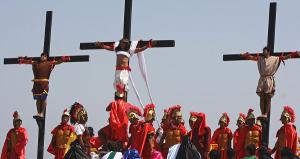 Good Friday – Suffering as a Means to Union with Christ
Good Friday – Suffering as a Means to Union with Christ
Because Christ has become man and suffered to redeem man, suffering is a primary means of participating in God’s nature and being united to Him.
But God’s presence, power, and love would not be given to man unless by some means the life of Christ, including His suffering, were communicated to His people. This means of communication is the Incarnation of Christ, in which the divine and human nature are joined together forever. All that Jesus accomplished through His suffering, including His exaltation and glorification in His Resurrection and Ascension, are now communicable to man.
So closely has God come to man that St. Peter teaches that we have become partakers of the divine nature (2 Peter 2:14). Jesus shares this new, “divinized” human nature with the Church, who partakes of Christ and has a blessed union with Him. The Church is called “The Body of Christ,” for Christ is truly in us through His Spirit. We have become “one flesh” with Him so that we are not only the Body of Christ but also his Holy Bride.
After Jesus’ human nature ascended into heaven in Acts 1, He sent His Holy Spirit into His Body to make it the living Body of Christ on earth. All throughout the book of Acts, therefore, the Church teaches and does what Jesus taught and did, since Jesus is living in and through the Church.
When the Church in the book of Acts and the Church today (for the Church is one) suffer, they suffer as Jesus Christ. The language Jesus uses when He called St. Paul on the road to Damascus is striking: “Saul, Saul, why are you persecuting Me?” (Acts 9:4.) So closely does Jesus identify with His Body and Bride the Church that even though Saul is persecuting the Church, Jesus ask Saul why he’s persecuting Him. The Church, therefore, as the Body of Christ and in union with Christ, suffers for, with, and as Jesus Christ.
We are especially united to Jesus Christ and His suffering through the sacrament of Baptism. St. Paul teaches: “Do you not know that all of us who have been baptized into Christ Jesus were baptized into his death? We were buried therefore with him by baptism into death, in order that, just as Christ was raised from the dead by the glory of the Father, we too might walk in newness of life. For if we have been united with him in a death like his, we shall certainly be united with him in a resurrection like his” (Romans 5:3-5.)
But when we are united to Christ in Baptism, we are united to all of Christ: first His suffering, then His death, and then His Resurrection and Ascension. Recapitulating the life of Christ, we suffer afflictions, and trials which then ultimately lead to glory and joy. For this reason Peter teaches: “But rejoice insofar as you share Christ’s sufferings, that you may also rejoice and be glad when his glory is revealed” (1 Peter 4:13).
At your baptism, the sign of Christ and His suffering was place upon you in the shape of the Cross, which also represents the Name of the Holy Trinity, the Father, the Son, and the Holy Spirit. At your baptism, Christ shared His Cross with you and has bound you to Him by it.
Because we are spiritually and mystically united to Christ, we will suffer as His Body. The suffering of the Church is, therefore, a sign that she belongs to Jesus Christ. We might even say that suffering is a sacrament of God’s presence. When the Church suffers for Jesus Christ, it must be because the Lord who suffered for us is very near.
The suffering of the Church is sacramental because it is a true participation in Christ and His sufferings. Our suffering is Christ’s suffering, and His suffering is our suffering. His Cross is our cross, and our crosses are His.
When we suffer, as members of His suffering Body, we each carry with us a splinter of the One True Cross. Unlike the medieval forgeries of the splinters of the Cross, however, each Christian who suffers is carrying a holy relic, a splinter of the suffering of Christ on the Cross.
God’s blessed and mighty redemption for us is, therefore, something He not only does for us but through us, for we are the Body of Christ, and God has made us partakers of His nature and redemption.
If God’ redemption were simply something He did to us, we’d be rocks.
If His redemption were something He did for us, we’d be children.
If God’s redemption were something He did with us, we’d be men.
But since God’s redemption is something He does through us, we are members of Christ’s Body.
Because of this, the Church also suffers as Christ, united to Him as His Body.
Many Christians believe that their suffering doesn’t count – that somehow the suffering that “counts” is only the suffering of those who are persecuted for Christ’s sake. But Christ has come to redeem all of our suffering, and all of our suffering is united to Christ by His suffering.
There is no suffering so small that it doesn’t count. All Christian suffering counts and is being redeemed by Christ!
Because Christ has become man and suffered to redeem man, suffering is a primary means of participating in God’s nature and being united to Him.
Cruxifixion – Creative Commons Attribution-Share Generic 2.0 license









